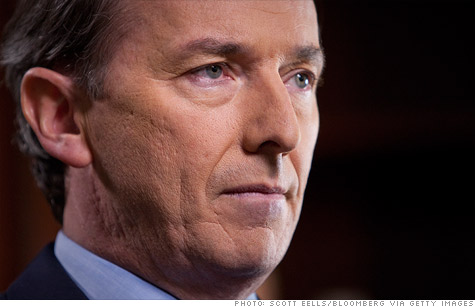
Morgan Stanley CEO James Gorman says "there are lot of opinions" on the Facebook IPO now that the offering is complete.
NEW YORK (CNNMoney) -- The way Morgan Stanley's CEO sees it, the Facebook IPO debacle has spawned a whole lot of Monday morning quarterbacks. And he doesn't like it one bit.
James Gorman appeared on CNBC with reporter Maria Bartiromo on Thursday to defend Morgan Stanley's role as lead underwriter in Facebook's initial public offering on May 18.
"Who knew there would be so much to talk about this time?" Gorman said dryly to Bartiromo, who visits the Morgan Stanley (MS, Fortune 500) trading desk once a year.
Bartiromo started by asking Gorman to respond to a clip of analyst Peter Cohen of Cowen Group making comments that, as she put it, "demonstrate widespread sentiments."
Cohen's take on the Facebook (FB) IPO: "I've never in 43 years seen something so bollocksed up."
Gorman laughed a little and replied, "It's interesting: If we ran the tape from the week before, it was, 'Should this be priced at $50 [instead of the $38 per-share IPO price]?"
He added: "There are lot of opinions. It's very different being in the room and understanding what the demand was at that point in time."
Gorman wouldn't say that demand "dried up," as Bartiromo put it, but noted that "this is a complicated story."
"It was one of the most volatile openings to an IPO ever," Gorman added. "It's also one of the largest, and [a company] that touches 900 million users. It's got hype in every direction."
Trading issues: Gorman quickly put the blame on Nasdaq, the tech-heavy stock exchange on which Facebook trades.
Facebook had been expected to open around 11 a.m. on that Friday, but it instead began trading a half-hour later. The following Monday, Nasdaq released a mea culpa explaining that the delay was due to a technical error -- which also led to some trades not executing correctly. Nasdaq is still untangling the fallout.
"Over the next couple of hours [after trading began], there was confusion and disarray," Gorman said. "Some people who thought they sold at $42 sold at $41. That confusion, in a deal of almost unprecedented size against a [difficult] macroeconomic backdrop ... created a potent elixir that set this aflame."
Bartiromo protested: "We all knew there was enormous hype." She asked Gorman what he would say to an individual investor who got burned.
"The group of people who bought the stock ... so they'd get an enormous pop were naïve," Gorman said. Investing for the short-term is risky, he added.
Facebook's stock ended close to flat in its debut, and it brushed near the $38 IPO price many times during the day. It never fell below that level, leading market watchers to assume that the underwriters were buying shares to keep the price above water.
Since then, Facebook shares have fallen more than 23%. They ended trading Thursday at $29.60.
'The story's not over': On May 23, a group of Facebook shareholders filed a lawsuit against Facebook, Morgan Stanley and other banks alleging that important information about Facebook's financial outlook was "selectively disclosed" to big banks ahead of the IPO.
The information involved specifics about Facebook's mobile revenue problems, which the company did previously disclose -- in less specific ways -- in an amendment to its S-1 paperwork for its IPO.
Morgan Stanley has insisted that it followed "the same procedures for the Facebook offering that it follows for all IPOs." Gorman didn't elaborate much on that point in the Thursday interview.
"There was no nefarious activity. There wasn't any desire to obfuscate or hide [information]," Gorman said, though he acknowledged that several regulatory bodies are looking into the allegations.
Toward the end of the interview, Gorman called Facebook "an American celebration. It's a phenomenon in itself."
That hype is contributing to volatility in the stock, and could abate with time, he said.
"The story isn't over. It's only been a little bit of time," Gorman said. "There was more hype going into this than any security ever traded. We all need to settle down, and get back to the fundamentals of 'what is this great company doing?'" ![]()